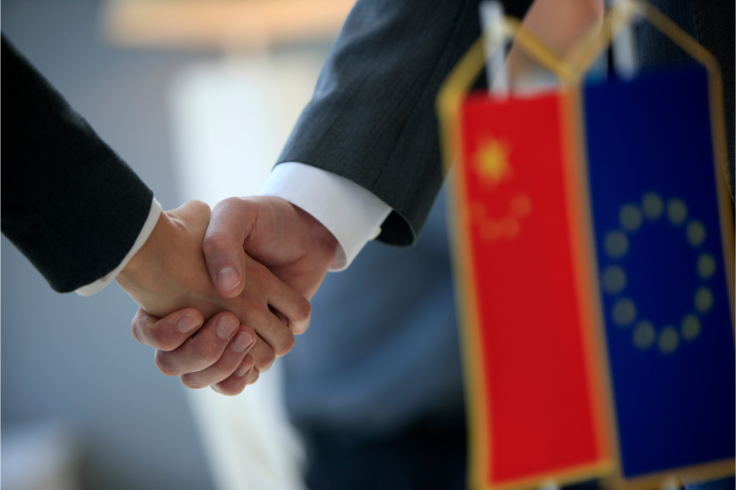America's NDAA Opens Opportunities for Europe to Address Economic Vulnerabilities Through Tech Integration
Trump's tariffs push Brussels closer to Beijing – but is the EU playing a dangerous game?

- The European Union has pursued a more collaborative policy towards China.
- The National Defence Authorization Act (NDAA) applies only to companies working on US federal-funded projects.
- Baidu and Dahua Technology's partnerships with European companies demonstrate the opportunities presented by technological integration.
In recent years, the United States has repeatedly demonstrated an increasingly wary stance towards China. In the face of rapid Chinese technological, manufacturing and financial growth, caution among Washington policymakers has grown so that scepticism towards China is now arguably a feature of US foreign policy.
The policy towards China has seen a marked uptick under both Biden and Trump, and the bipartisan consensus at the Capitol for ever more restrictive and penalising legislation has been growing.
This stance is not merely bureaucratic, however. In a landmark 2022 interview with 60 Minutes, then US President Joe Biden stated that the US would intervene militarily to defend Taiwan in the event of an 'unprecedented attack' by China. Even if White House officials later claimed that the US stance regarding Taiwan had not changed, this statement spoke to hardening attitudes regarding China, representing a significant shift from the long-standing policy of strategic ambiguity.
Under Trump, the rhetoric around China has been even sharper and more frequent. Before assuming the presidency, he promised 'aggressive new restrictions' on Chinese ownership – a pledge he has doubled down on since taking office. Indeed, in his efforts to restructure the global economy, particularly through his imposition of 'Liberation Day' tariffs, Trump has leaned on other countries to follow suit and reduce economic ties with China.
Europe Turns US NDAA Restrictions Into a Goldmine: Brussels Cashes In on EU-China Trade
In this vein, a useful yardstick against which to consider US policy towards China is that of the European Union. Although a traditional US ally, the bloc has demonstrated clear differences in its policy towards China.
Partially in response to Trump's various pressures, the EU has adopted a more pragmatic, engagement-driven approach towards Beijing and has sought to promote bilateral trade and positive relations where possible.
Spanish Prime Minister Pedro Sánchez's meeting with Xi Jinping just shortly after 'Liberation Day' sent a clear signal of the EU's different approach towards relations with the world's second-largest economy. Similarly, the recent EU-China summit was a clear indication of the mutual desire to maintain functioning trade relationships and dialogue streams.
The automotive sector offers a compelling and concrete illustration of this cooperation. Chinese electric vehicle manufacturers are actively partnering with their European counterparts, for example, with such collaborations growing in scale and ambition.
BMW Bets Big on Huawei as EU Embraces Chinese Tech Europe Won't Ban
In contrast, the US National Defence Authorization Act (NDAA) imposes strict limitations on American manufacturing and tech industries. Contained within this annually renewed bill are various sections which mandate the restriction or heavy regulation of Chinese technology in federal-funded contracts.
However, it is vital to note that while EU companies that contract with the US government are subject to these regulations, the EU market remains unaffected by such laws.
In this way, European firms can enjoy a significant competitive advantage over their American counterparts, as they are more readily able to access affordable and highly effective Chinese technology solutions.
One example of the potential for EU-Chinese tech collaborations is BMW's recent decision to integrate Huawei systems into its cars – many of which are already produced in China – starting next year. Baidu is preparing to operate its driverless taxi service in Europe for the first time, setting up a local entity in Switzerland by the end of 2025.
From Swiss Robotaxis to German Solar Farms: Chinese Tech in Europe Is Powering the Future
Elsewhere, Chinese tech firms such as Dahua Technology are helping to secure Europe's sustainable future. Partnering with European renewable energy producers, the video security manufacturer has developed innovative solutions to effectively address security challenges at solar plants in Germany and Italy over the past few years.
These examples demonstrate the clear opportunity for European firms to leverage the legislative leniency offered by the EU, which is not saddled with the US's NDAA.
Ultimately, these differing regulatory frameworks on either side of the Atlantic reflect deeper strategic and political decisions. While Washington may be seen to prioritise American industry and containment, Brussels has positioned itself in favour of commercial and economic pragmatism.
© Copyright IBTimes 2025. All rights reserved.





















